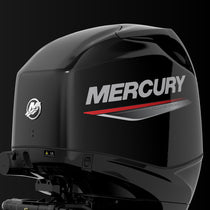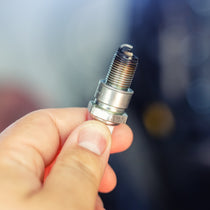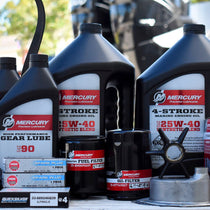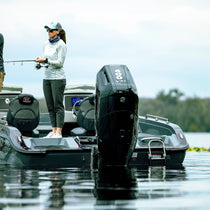Whether you’re new to boating or are just having trouble with your Mercury outboard, this article addresses the most common scenarios where you may find yourself asking, “How do I start a Mercury outboard motor?”
Let’s start with the basics.
How to Start a Mercury Outboard Motor

Mercury makes a 2-stroke and 4-stroke engine. The 4-stroke engines have risen in popularity due to their reduced noise, fuel efficiency, and greater longevity. Because they’ve grown in popularity in recent years, most of them tend to be newer. Typically, they’re as easy to start as tilting them down and turning the key.
In contrast, a carbureted 2-stroke may not be as simple to start.
How to Start a Mercury 2-Stroke Outboard Motor
- First, tilt the engine so that the fuel can more easily reach the carburetor
- Prime the bulb until it’s too hard to squeeze
- While in neutral, advance the throttle to ⅔
- Turn the key, push to choke and crank
- Release the choke and return to neutral
How to Cold Start a Mercury Outboard Motor
If your engine is particularly finicky, you may find that it has trouble functioning before it's warmed up. The best method for cold starting your engine will depend on the type of engine you have.
Remote Keyed Ignition:
- Put the motor in neutral and fast-idle
- Push in the key, turn to start, and hold it in until the outboard starts up
- Release the key
- If the motor begins to stumble at this point, bump the key again to engage the choke & primer
- Repeat until the engine is running smoothly
- Slowly reduce the fast-idle
At this point, the motor should be warmed up and running independently.
Tiller Start: Manual Choke
- Put the motor in neutral and place the throttle in the start position
- Engage the choke
- Either push the start button, or if you don’t have one, pull the starter rope
- Slowly disengage the choke
- As the motor begins to warm, move the throttle from the start to the shift position
All this assumes that you’ve already checked your battery, fuel connections, fuel tank ventilation, and other potential causes for outboard issues.
Addressing Mercury Motor Starting Problems
How to Start a Flooded Mercury Outboard Motor
What causes a flooded outboard motor, and what does it mean? A flooded motor has too much fuel in the cylinder, and it can therefore be very difficult-- or impossible-- to start. A strong smell of gasoline may indicate that this has occurred.
Even if your motor does start while flooded, it’s important to address it immediately anyway. Running a flooded motor can damage the whole system, leading to a much larger (and more expensive) set of problems.
Now, to address the problem: wait about five minutes before you clear-flood start the engine. You do this by moving the throttle to the clear-throttle or wide-open throttle position and crank your engine. This allows air to enter the engine, but not fuel, and should get things moving along. It may take a few tries for this to be effective.
How to Prevent a Flooded Mercury Outboard Motor
The three most common causes of a flooded motor are the improper use of the choke, improper priming, and low cylinder pressure.
The choke can be used to give your motor a boost of fuel, but must be disengaged immediately to prevent overwhelming the cylinders with fuel. Similarly, be sure never to over pump your primer bulb. Doing so will stop the spark plugs from igniting.
Finally, if the head gasket needs to be replaced, this could result in low air pressure inside the cylinders. In such cases, fuel buildup will be gradual.
It’s worth it to take your outboard to a mechanic if the problem persists. The flooding could be caused by leaks or failed parts that need to be quickly addressed.
Troubleshooting Your Mercury Marine Engine

If your Mercury boat engine cranks, but won’t start, there may be an issue that needs correcting.
Most likely, the cause is a low and dying battery. Remove the battery from its housing by first disconnecting the black (negative) cable, and then the red (positive). You can then check the voltage using a voltmeter-- it should be at about 12.6 volts. Inspect the battery for damage and clean off any corrosion or other buildup with a wire bristle brush.
Some types of residue can be removed with a mixture of water and baking soda at a ratio of 1 cup:1 tablespoon, respectively. Apply and scrub the mixture over the affected parts. If you choose to do this, be sure to very thoroughly dry the battery before reattaching the cables. Finally, if the voltmeter resulted in a low reading, charge the battery.
In cases where your battery won’t hold a charge, it will of course need to be replaced. In the meantime, you may be able to start the engine manually.
How to Manually Start an Electric-Start Outboard Motor
If the engine is under 25HP, you shouldn’t have too much trouble removing the cowl cover and using the emergency cord to pull-start. This is generally possible for engines up to 50HP, but it will be increasingly difficult the higher the horsepower. To do this:
- Ensure that the key is in the on position and that the shift is in neutral
- If you’re using a rope, tie a knot so that the rope can be secured in the notch in the flywheel
- Wrap the rope around the flywheel in the correct direction for your engine, which is most likely clockwise
- Pull repeatedly until the engine starts
- Put the cowling back on once the flywheel stops spinning
If this doesn’t solve your problem, you may need to go through a more thorough troubleshooting process. Our guide, Why Your Mercury Outboard Motor Stopped Working, outlines everything you’ll need to check in greater detail, with handy flowcharts for reference. You can shop for your boat parts at PartsVu.

Looking for a new Mercury outboard? Browse Mercury outboards at PartsVu.




















12 comments
I bought a 6 hp manual start engine. I have so much trouble starting this motor. It has taken up to an hour trying to start it. If its cold outside about 40 degrees its next to imossilble. The only way to start this motor is i have to use a brand new plug. I warm it up then change it back. It really take the Fun right out of fishing.. I’m ready to sell it if anyone would want it.
[…] More items… […]
[…] More items… […]
[…] More items… […]
[…] More items… […]